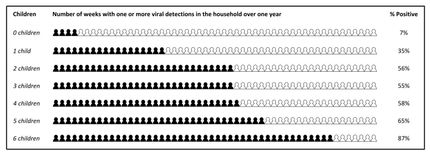Researchers Identify Protein that Fights West Nile Virus
Yale and McGill University scientists have identified a protein that is critical in fighting mosquito-borne West Nile Virus in mice. This finding could have therapeutic implications for controlling the potentially deadly virus in humans. The study appears in Nature immunology.
Researchers studied the role of caspase-12, a protein that activates secretion of substances that are part of the body’s immune response. Caspase-12’s function in fighting bacterial infection has been studied before, but its role in viral immunity has not.
The Yale-McGill team found that caspase-12 regulated the signaling of RIG-I, a protein of the immune system that detects viral infection by recognizing its genetic components. This recognition pattern is necessary to trigger the immune system’s response to West Nile Virus.
“Mice without caspase-12 protein died more rapidly from West Nile virus infection and had higher levels of virus than normal mice,” explained co-author Erol Fikrig, M.D., professor of epidemiology, public health and microbial pathogenesis at Yale School of Medicine and a Howard Hughes Medical Institute investigator.
The team’s findings open possible avenues of future research on whether the human immune system can be regulated in the same way, noted co-author Maya Saleh, Ph.D., assistant professor of medicine at McGill University and medical scientist in the Division of Critical Care at the Research Institute of the McGill University Health Centre. “Our results now set the stage for the development of pharmacological compounds to boost the activity of caspase-12 in promoting virus elimination,” Saleh said. “These findings have significant potential to be translated into therapies.”
Topics
Organizations
Other news from the department science

Get the life science industry in your inbox
By submitting this form you agree that LUMITOS AG will send you the newsletter(s) selected above by email. Your data will not be passed on to third parties. Your data will be stored and processed in accordance with our data protection regulations. LUMITOS may contact you by email for the purpose of advertising or market and opinion surveys. You can revoke your consent at any time without giving reasons to LUMITOS AG, Ernst-Augustin-Str. 2, 12489 Berlin, Germany or by e-mail at revoke@lumitos.com with effect for the future. In addition, each email contains a link to unsubscribe from the corresponding newsletter.



















































